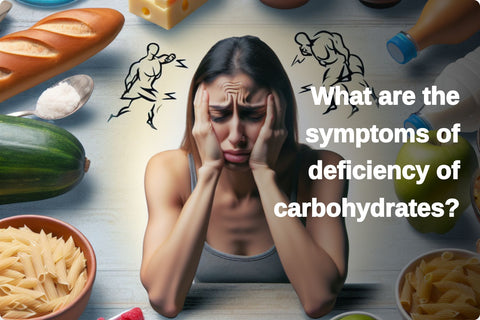
How many carbs do you need in a day to lose weight?
Carbs are essential for weight loss, but finding the right balance is vital. Consuming the right carbs helps the body burn calories and fat during exercise. However, too many carbs can lead to weight gain.
Striking a balance that provides energy while creating a calorie deficit is the key to successful weight loss. Understanding your carbohydrate needs and incorporating them wisely into your diet can pave the way for a healthier lifestyle and successful weight management journey.

Understanding Carbohydrates and Weight Loss
Carbohydrates come in two types: simple and complex.
Simple carbs are found in sugary foods and beverages, providing quick energy but can lead to blood sugar spikes.
Complex carbs, present in whole grains, fruits, and vegetables, release energy slowly, making you feel full for longer periods. They are also rich in essential nutrients and fibre, aiding in weight loss and maintaining satiety.
It is crucial to balance the number and quality of carbs consumed to achieve weight loss goals. A guideline is to aim for moderate carb intake while focusing on whole, nutrient-dense sources of carbohydrates.
Tracking carb intake can be helpful in reaching weight loss goals. By planning meals rich in complex carbs and monitoring one's daily consumption, maintaining a balanced diet that supports the weight loss journey becomes easier.
Remember, the quality of carbs you consume matters just as much as the quantity when it comes to achieving sustainable weight loss. Strike a balance, stay mindful of your carb choices, and watch your progress towards a healthier you.
Determining Your Carbohydrate Needs for Weight Loss
Determining one's ideal daily carbohydrate intake for effective weight loss depends on individual factors such as activity level, metabolism, and weight loss goals. The recommended daily carb intake for weight loss is different for each person.
However, a general guideline is to aim for a moderate carb intake of 45-65% of total daily calories for most individuals.
For instance, if an individual is on a 1500-calorie diet, the ideal carb intake should fall between 675 and 975 calories.
When planning meals, focus on consuming complex carbohydrates such as whole grains, fruits, vegetables, and legumes. These sources provide sustained energy and essential nutrients while aiding in weight loss. However, remember that moderation is critical because not all carbs are the same. Opt for nutrient-dense carbs and avoid processed or sugary foods.
Always listen to your body's signals and adjust your carbohydrate intake accordingly. Notice how different carbohydrate amounts affect your energy levels, cravings, and overall well-being.
Meal Planning and Carb Counting
Meal planning is crucial to maintaining a balanced diet and achieving weight loss goals. The recommended daily carb intake for weight loss varies depending on age, weight, activity level, and metabolic rate.
To determine how many carbs you should consume daily to lose weight, it is essential to understand your calorie needs and macronutrient distribution. Researchers define low-carbohydrate diets as containing less than 20 to 120 g of carbohydrates per day. Different diets may restrict carbs to a different degree. Some may allow you to eat a bit more.
To lose weight, one can follow a diet low in carbs, which focuses on low-carb intake and balance it with other nutrients so that the body loses weight by burning fat.
A few Examples of such diets are:
Ketogenic diet (keto diet) prioritises burning fat for fuel. It achieves this by severely restricting carbs (typically 20 to 50 grams daily) and replacing them with fat. This metabolic shift, called ketosis, can lead to weight loss.
The Atkins diet is a low-carb approach to weight loss. It involves restricting carbs while eating plenty of protein and fat. The plan consists of 4 phases, starting with a very low-carb induction phase (under 20g carbs daily) to jumpstart weight loss. Gradually, carbs are reintroduced in later stages.
The Zone Diet promotes weight loss and overall health through a specific food ratio and portion control methods. Focuses on a 40% carbs, 30% protein, and 30% fat ratio in your meals. The Zone Diet offers a structured approach to portion control and food choices. You can consult a doctor or dietitian before starting a new diet plan.

The Bottom Line
Carbohydrates play a significant role in weight loss as they are the body's primary energy source. Finding the right balance is crucial for achieving and maintaining weight loss goals. Moderation is key when considering how much carbs a day for weight loss. Consuming a balanced amount of carbs can support weight loss by providing energy for workouts and preventing overeating. Remember, not all carbs are created equal - prioritise complex carbohydrates like whole grains, fruits, and vegetables over simple sugars and refined carbs.
The key to successful weight loss is understanding your carbohydrate needs and making informed choices. By planning meals wisely and tracking your carb intake, you can stay on track towards your weight loss journey. Therefore, the ideal way to determine how many carbs per day to lose weight is to calculate your carbohydrate needs based on factors like activity level and metabolism.
This Blog post is an initiative by Lo! Foods, to provide accurate and Nutritionist / Doctor approved information related to Health. Lo! Foods is India's leading brand for Everyday Functional Foods. Foods designed for specific Health conditions or Needs. Lo! Foods also runs India's largest range of Low Carb Healthy Cloud Kitchens, under the brand names of Lo!, ProteinChef, ATH (All Things Healthy) and DiabeSmart.













Leave a comment
Your email address will not be published.